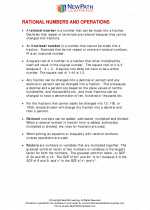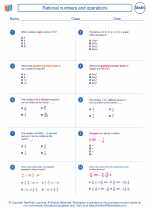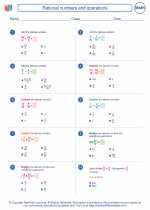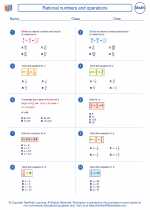Rational Numbers
A rational number is a number that can be expressed as a fraction, where the numerator and denominator are both integers, and the denominator is not zero. Rational numbers can be positive or negative, and can also be whole numbers or integers.
Examples of Rational Numbers
- 2 (can be expressed as 2/1)
- -5 (can be expressed as -5/1)
- 3/4
- -7/2
Operations with Rational Numbers
Addition and Subtraction
When adding or subtracting rational numbers, you need to find a common denominator. Once you have a common denominator, you can add or subtract the numerators and keep the denominator the same.
Example:
Let's add 1/3 and 2/5.
First, find a common denominator, which in this case is 15.
1/3 = 5/15 and 2/5 = 6/15
Now, you can add the fractions: 5/15 + 6/15 = 11/15
Multiplication and Division
When multiplying or dividing rational numbers, you simply multiply or divide the numerators and the denominators.
Example:
Let's multiply 2/3 and 3/4.
2/3 * 3/4 = (2*3)/(3*4) = 6/12 = 1/2
Study Guide
- Understand what rational numbers are and be able to identify examples of rational numbers.
- Practice finding common denominators when adding or subtracting rational numbers.
- Practice multiplying and dividing rational numbers.
- Simplify fractions and understand how to convert between mixed numbers and improper fractions.
- Work on word problems involving rational numbers to understand real-life applications.
By mastering these concepts and practicing different types of problems, you will become proficient in working with rational numbers and operations.
.◂Math Worksheets and Study Guides Eighth Grade. Rational numbers and operations

 Worksheet/Answer key
Worksheet/Answer key
 Worksheet/Answer key
Worksheet/Answer key
 Worksheet/Answer key
Worksheet/Answer key
